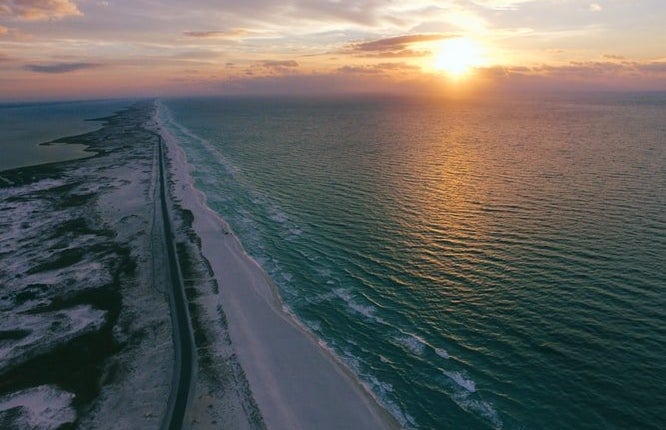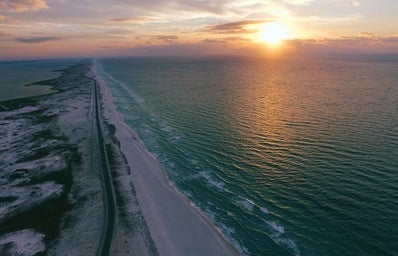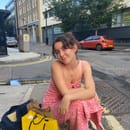On family holidays as a child, I borrowed my mum’s digital camera and recorded tours of the Cornish holiday cottages where we stayed, lingering on ever important details about whether I had a double bed or if I was sharing a room with my brother, and ignoring the seaside views from the windows. A dark screen and the sound of a whirring camcorder conjures up nostalgia from the offset in Charlotte Wells’ stirring and familiar directorial debut, Aftersun (2022). The film follows father-daughter duo Calum (Paul Mescal) and Sophie (Frankie Corio) on their summer holiday to a tired resort in the Mediterranean. Adult Sophie appears on screen in sporadic moments of strobe, showing us her present-day self revisiting this memory. The screenplay meanders through their trip with a pleasant slow pace, and the inflections of hurt and complication never stray from the realism Wells evokes. Exploring loss of innocence and the growing realisation that our parents are as complexly human as we are, the film produces a richness of emotion and depth of character that reminds us of what it is to be a child on the brink of their teenage years.
The two leads interact with an ease which I have not recognised before on screen. Wills’ direction, which scatters videos taken on Sophie’s camcorder amongst vibrant shots of beaches and swimming pools, creates a wistful depiction of summertime as an eleven-year-old, without ignoring achingly painful realities which often go unnoticed in youth. Aftersun is a story of rediscovery, as present-day Sophie deciphers memories tainted by time to regain a sense of who her dad was. We, as spectators, observe through Sophie’s eyes. We only know what she knows, and we have to deduce everything else, in the same way that grown-up Sophie does retrospectively.
‘Aftersun is a story of rediscovery, as present-day Sophie deciphers memories tainted by time to regain a sense of who her dad was.’
Without playing into cliché coming-of-age tropes, Wells’ film explores girlhood and growing up with a delicate accuracy. Sophie is fascinated by the older kids who are staying at the resort, desperate to catch up and be like them. In the pool, the camera focuses on a frenzy of teenage bodies under the water, whereas Sophie’s toes can barely reach the ground. Corio plays a girl teetering on the border of adolescence with relatable clarity. She is both young enough to be nurtured and old enough to be nurturing. She is tucked into bed by her dad, and in turn tucks him into bed when he is drunkenly passed out. But the film persists to remind us of her youth. Her bruised knees are the image of childhood play, and her straightforward questioning and search for truth shows how she has not yet been maimed by a world that criticises honesty. Corio portrays the feeling of being eleven and of being both in awe of and perplexed by adulthood with a proficiency I haven’t seen before in film.
Wells abolishes conceptions of the traditional family unit in Aftersun, placing the onus on love and openness rather than conventionality. Calum has split from Sophie’s mother and doesn’t see his daughter very often. When he does, he navigates fatherhood not without struggle, but at no point in the film does Wells want us to doubt his ability to parent Sophie with all his love and care. Wells said herself in an interview that she thinks Calum is ‘better at being a father than he is at just about being anything else.’ Sophie’s complete adoration of him is testament to this. They lounge together on sunbeds at the beach, and when Calum adjusts his position to shade his eyes from the harsh sun, Sophie watches and copies him.
Prevalent also in Normal People (2020), Mescal’s on-screen debut, the actor’s ability to bring to life characters with subtle and real emotional gravity is astounding. Calum’s character is deeply flawed, guarded and distant, reluctant to speak about his past and at times scared of his daughter’s vulnerability. He is obsessed with self-improvement, bringing piles of self-help books on holiday and practicing Tai Chi. Implicitly, he conveys a sense of displacement and a pain rooted in a past which Wells chooses to leave to the imagination. What makes the film unique is the lack of concern for factual truth, rather the focus on the reality built by Sophie’s perception of her father. Mescal’s performance is hypnotizing and excruciatingly real, injecting complexity into the face-value simple story told in Aftersun.
‘There’s this feeling – once you leave where you’re from – that you don’t fully belong there again.’
There is often an attached poignancy when an adult speaks to a child about mature subjects which they could not possibly understand at their age. This is the frame that Wells uses and challenges, as she explores massively complex issues, whilst offering the idea that children have a greater emotional understanding than they are known for. Calum and Sophie’s overtly normal father and daughter relationship is interspersed with moments of tender consideration, where Sophie proves to be attentive to her dad’s emotional needs. The dialogue performed expertly by Corio and Mescal is natural and telling, allowing us to gain an understanding of the pain that Calum hides from his daughter.
My friends and I each had different interpretations of the ending of the film. But I don’t think Aftersun is about explanation and answers. The camcorder footage allows present-day Sophie the chance to look again, to re-live, to scrutinise. She seeks to recognise the father who she thought she knew so well. Whether she finds any answers, or what the questions were in the first place, I don’t know. I do know that Wells’ examination of paternal relationships and loss of innocence was executed with intimacy, care and power.
Reference:
https://www.anothermag.com/design-living/14529/charlotte-wells-aftersun-interview-paul-mescal


